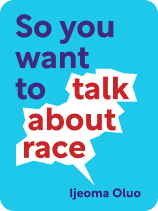

This article is an excerpt from the Shortform book guide to "So You Want to Talk About Race" by Ijeoma Oluo. Shortform has the world's best summaries and analyses of books you should be reading.
Like this article? Sign up for a free trial here .
What is the main message of So You Want to Talk About Race by Ijeoma Oluo? What are the key themes discussed in the book?
So You Want to Talk About Race by Ijeoma Oluo is a handbook on how to have intelligent, productive, and empathic conversations about race. Beyond giving practical advice on how to talk about race, the book also addresses broader inequality issues including privilege, intersectionality, cultural appropriation, and the model minority myth.
Here is a brief overview of So You Want to Talk About Race by Ijeoma Oluo.
Book Overview: So You Want to Talk About Race by Ijeoma Oluo
We need to talk about racism. But, for white people and people of color alike, talking about it can feel like navigating through a minefield. So You Want to Talk About Race by Ijeoma Oluo is a handbook for anyone who wants to improve how they talk about race, though most of it focuses on awareness-raising among white people.
Because the book is written from the perspective of a black woman, it largely draws on the experiences of African Americans in the United States, though there are occasional references to the experiences of Native and Asian Americans.
So You Want to Talk About Race by Ijeoma Oluo has 17 chapters, each addressing one of 17 questions that people commonly ask about conversations on race, for example, “What if I talk about race wrong?”, “Why can’t I touch your hair?”, and “Is police brutality really about race?” A condensed summary of So You Want to Talk About Race by Ijeoma Oluo is available here.
Ijeoma Oluo’s Story
Ijeoma Oluo was born in the United States to a white mother and a Nigerian father. She married early and had two children, completed her college degree as a working single mother, and worked her way up the ladder in the white-dominated Seattle tech industry.
In her 30s, she found her conditioned acceptance of racism dwindling. She stopped bending over backwards to prove that she was professional, hardworking, excessively polite, and definitely not an angry black woman. She stopped letting racist jokes slide, she started having difficult conversations with her friends, and she converted her food blog into something more personal: a site that offered insights and analysis on race-related topics that were designed to be more useful, analytical, and personal than the superficial “hot takes” usually published on these topics.
When she started questioning, resisting, and bringing up racial injustice with those around her, it did not go well. Her white friends (and growing up in Seattle, most of her friends were white) became uncomfortable. She wasn’t “fun” anymore. Despite their willingness to get angry about global warming and political corruption, they didn’t feel the same way about racial injustice. As these former friends fell away from her life, people of color who responded to her online posts replaced them, and she found comfort, community, and strength in this online community.
After some time writing for online magazines, Ijeoma Oluo decided to write a book, combining and extending her ideas and giving useful, no-nonsense advice on how to talk about race. That book is So You Want to Talk About Race.
The Context of the Book’s Publication
Oluo’s decision to speak out added her voice to the emerging voices of many others. Increasing numbers of white Americans, as well as Americans of color, now see racial justice as an urgent issue, and more and more white people are at the table and ready to engage in the conversation.
But because issues of race have been papered over for so long—because talking about race has always been something best avoided in polite company—people who want to start talking are finding that they don’t know how to have the conversation.
People of color are nervous about having their experiences minimized or dismissed. They’re wary of knee-jerk defensiveness, and they’re exhausted from dredging up their trauma to explain the same things over and over again.
White people are afraid of hurting or offending their conversation partner. They’re fearful of being called racist, and they’re unaccustomed to the feelings of discomfort that arise when they confront the ways in which their own privilege comes at the expense of others.
These conversations are usually upsetting for everyone involved. But remember that the conversations are upsetting because racism is upsetting, not because we’re suddenly talking about it. We can’t let our fear win. Having these conversations is the beginning of profound, permanent social change.

———End of Preview———
Like what you just read? Read the rest of the world's best book summary and analysis of Ijeoma Oluo's "So You Want to Talk About Race" at Shortform .
Here's what you'll find in our full So You Want to Talk About Race summary :
- How to have an intelligent, empathetic conversation about race
- Why people are afraid to talk about race
- Where racism came from and what fuels it






